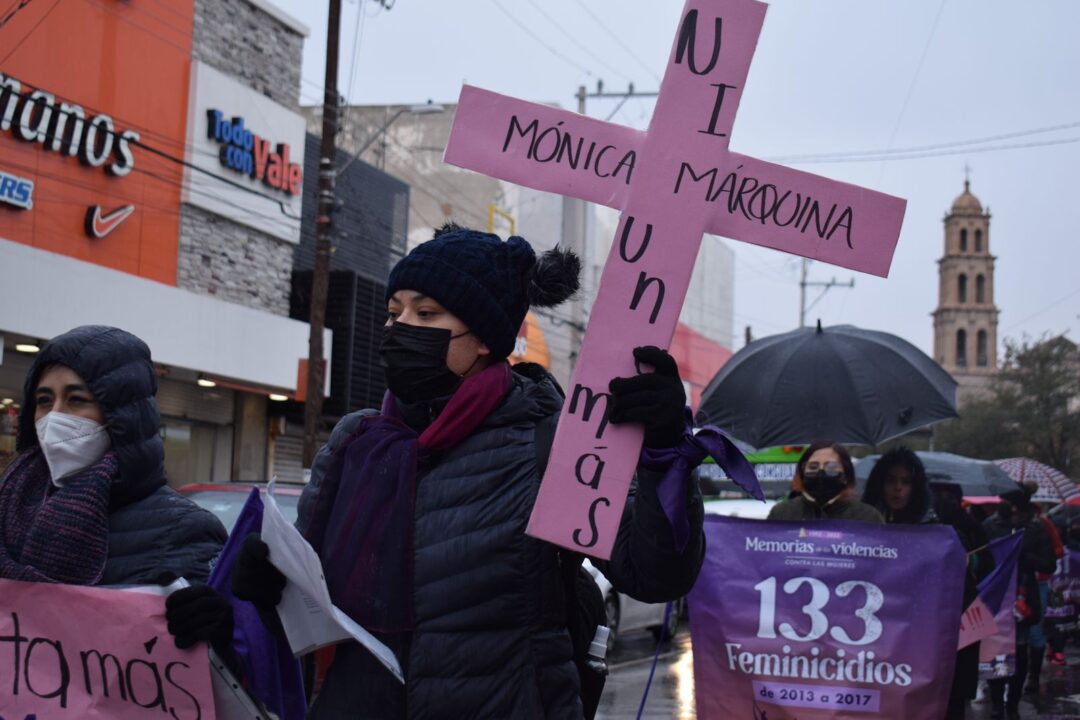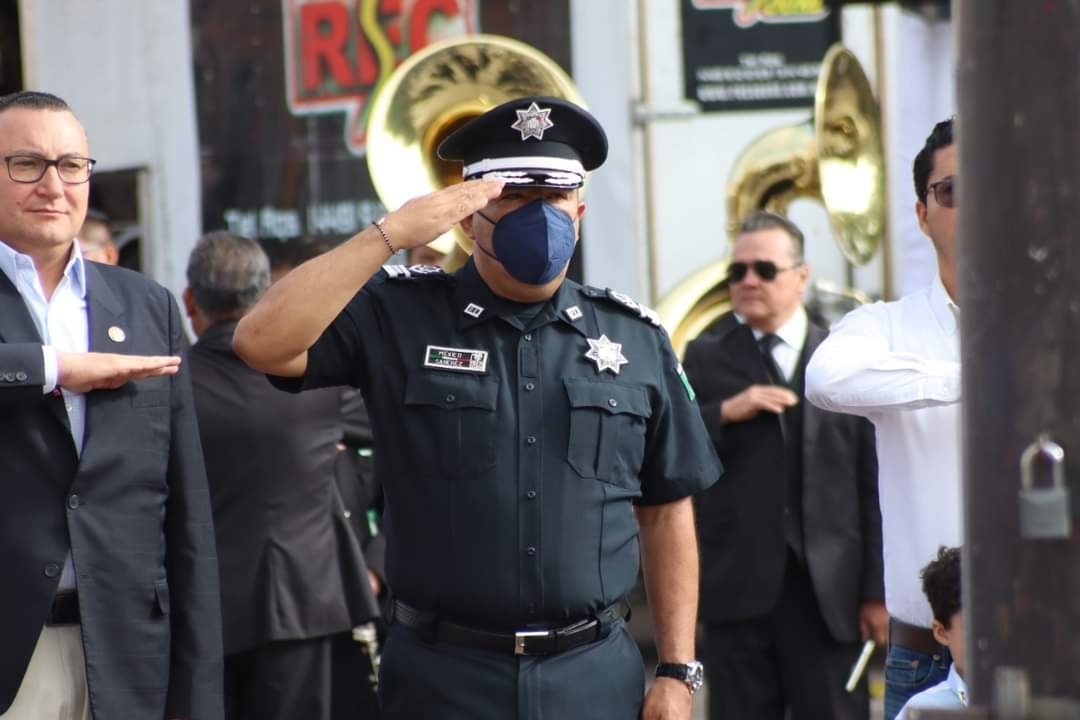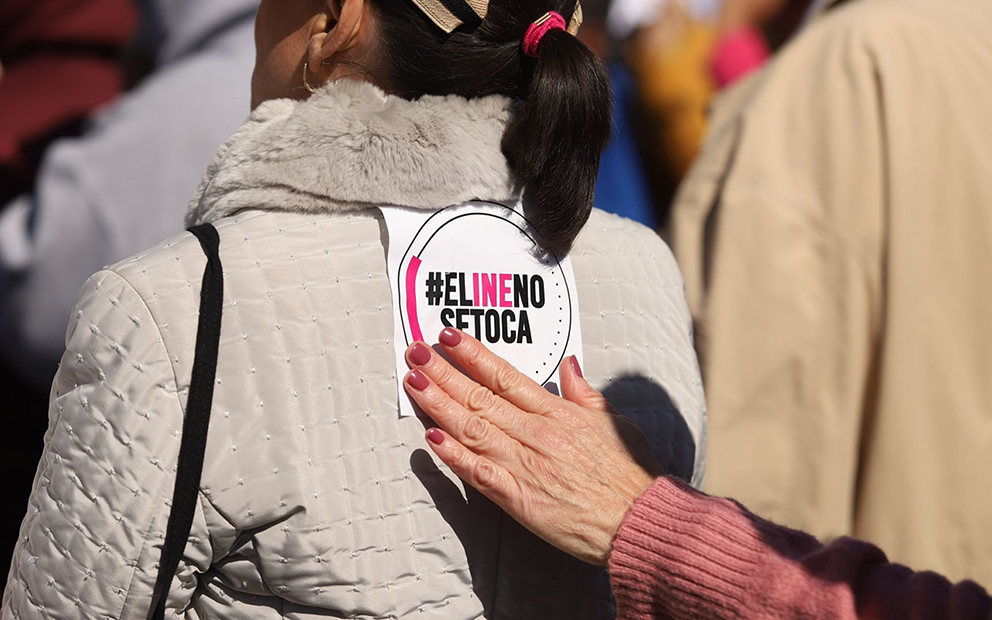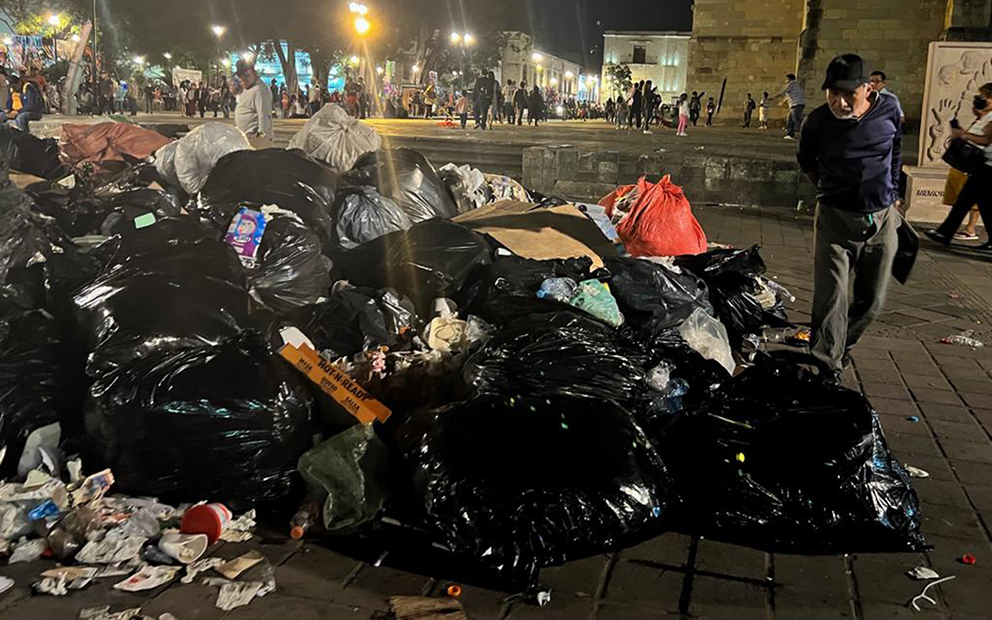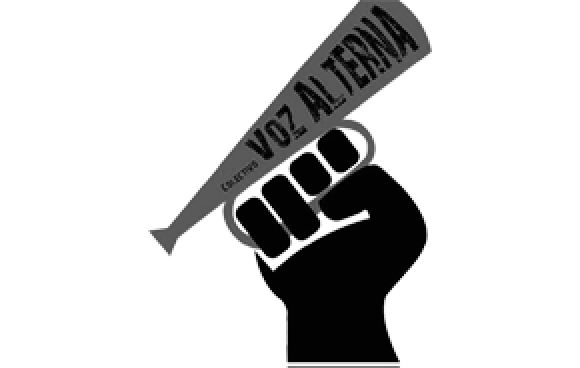Zapatistas, women, and gender dissidents: on the encounter in Notre Dame des Landes
18 agosto, 2021
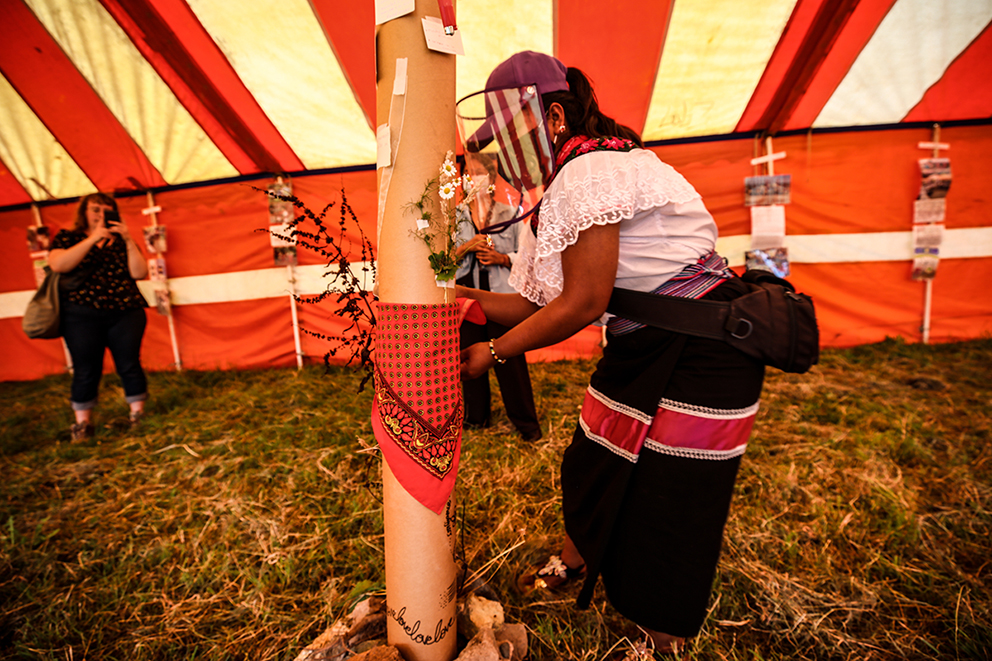
More than 500 women and non-binary people who exercise sexual dissidence spoke in the first meeting of this type done in Europe, during the visit of the Zapatista maritime delegation, the Squadron 421
Text and photos by Daliri Oropeza, originally published on August 7, 2021
Translation by Linda Quiquivix for Capitalism, Nature, Socialism. Edited by Pie de Página in English
NOTRE DAME DES LANDES, FRANCE.- The Encounter of Women, Trans, Inter, and Nonbinary People at the Zone to Defend (ZAD) in France’s Notre Dame des Landes marked the first encounter held between the Zapatista delegation in Europe and those hailing from multiple dissidences, struggles, and gender rebellions. The event was called Many struggles to live, one heart to struggle.
This festival of the word and of the exchange of knowledges was prompted by the Zapatista visit to Europe, first as an encounter with women and non-binary people and then, after a one-day break, as an intergalactic that also included cis (heteronormative) men.
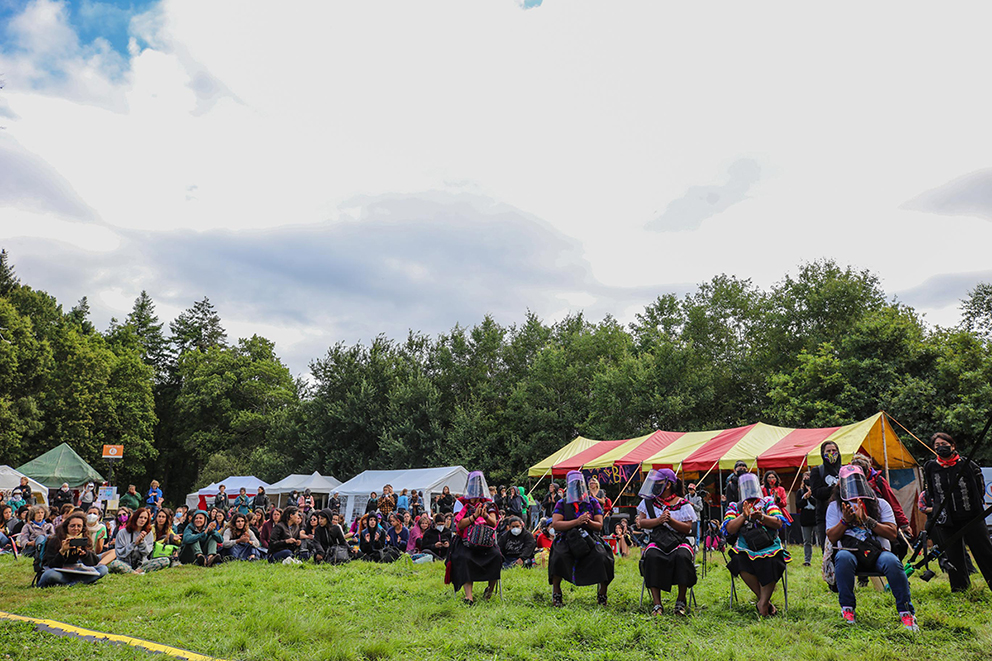
The encounter was organized by the Gender Commission of the European Coordination for the Zapatista Journey together with the defenders of the ZAD; the Paris Ayotzinapa Collective; and Women and Dissidents of the Sexta in the Other Europe and Abya Yala.
Microphone in hand, the event’s spokeswoman gave the inaugural speech in front of the guests of honor: Marijose, Carolina, Yuli, Lupita, and Ximena, the women and non-binary members of the Zapatista maritime delegation, Squadron 421, who listened to the interpretation through a shortwave radio at the front of the stage: “The ZAD is a territory that symbolizes resistance, the defense of the earth and life, and with it the defense of many forms of life. Their struggle teaches us that without territory there is no autonomy.”
The encounter started off with a Mapuche drum invoking the ancestors in a territory where the organization and self-management of peasant women, farmers, and solidarity activists—all who occupied the forest despite federal expropriation—managed to stop a mega airport project that sought to be one of the largest in France designed for tourism, second only to Paris’ Charles de Gaulle airport.
From July 28 to August 1, the humid forest welcomed the embrace and dialogues that Zapatismo has provoked with its trip to various countries of the European continent, a land renamed by Marijose—a trans member of Squadron 421—as Rebellious Land, or Slumil K’ajxemk’op.
“The reason for this encounter is to provoke a space for sharing, for resonance, but above all, as the Zapatistas say: a space for listening. We have chosen to convene in a mixed way (by choice, open to the dissident community) to dialogue from different feminisms, from our different positions and experiences of struggle, to create what we consider powerful: the connection and construction of networks,” said the speaker.
In her assessment, she said in the political context in Europe, the COVID-19 pandemic legitimized repression and social control. With this, “appropriation, dispossession, and exploitation—the typical means of a capitalist colonial system,” were accelerated, she said into the microphone.
Such was the urgency of holding this encounter. The organizer assured on the microphone that “it is urgent that we live” and quoted the Zapatistas on the theme of difference: “It is urgent we exist by respecting difference, as our Zapatista compas put it: ‘When difference encounters another equally significant but distinct difference, it embraces and celebrates it. Difference doesn’t seek a mirror, but rather something much more complex, more human: respect.’ Confronting barbarism can only be done by organizing.”
The word of the ZAD
“Our collective experience is violated,” proclaimed the spokeswoman for the ZAD movement after taking the microphone at the inauguration.
In welcoming the more than 500 participants, she assured they knew that despite having prevented an airport in this forest, they will continue to exercise self-management and the struggle for land because “it will continue to be a disputed territory” for the interests of corporations and capitalists.
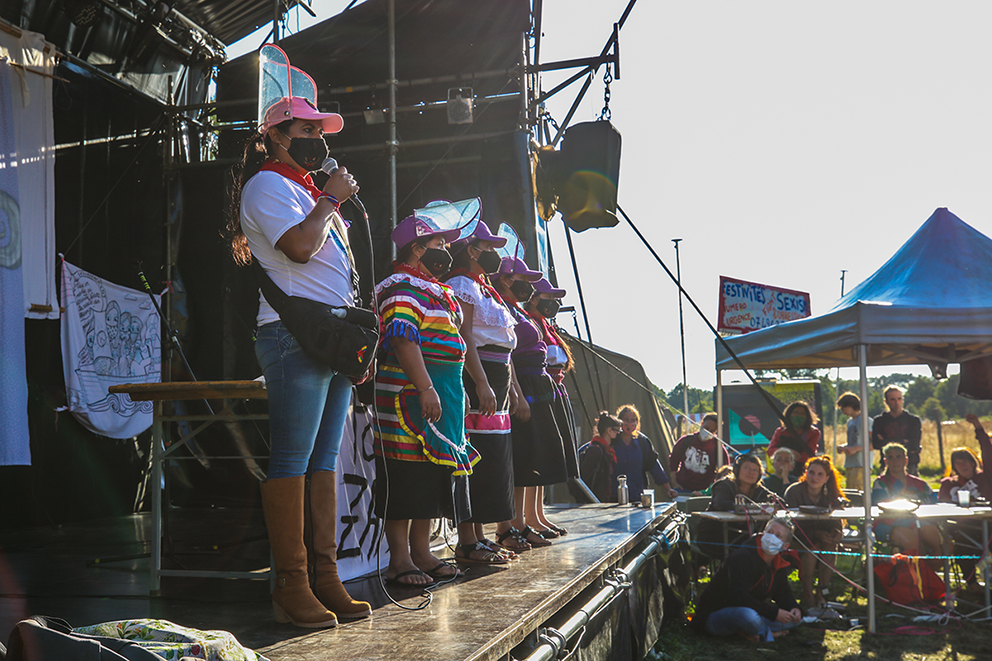
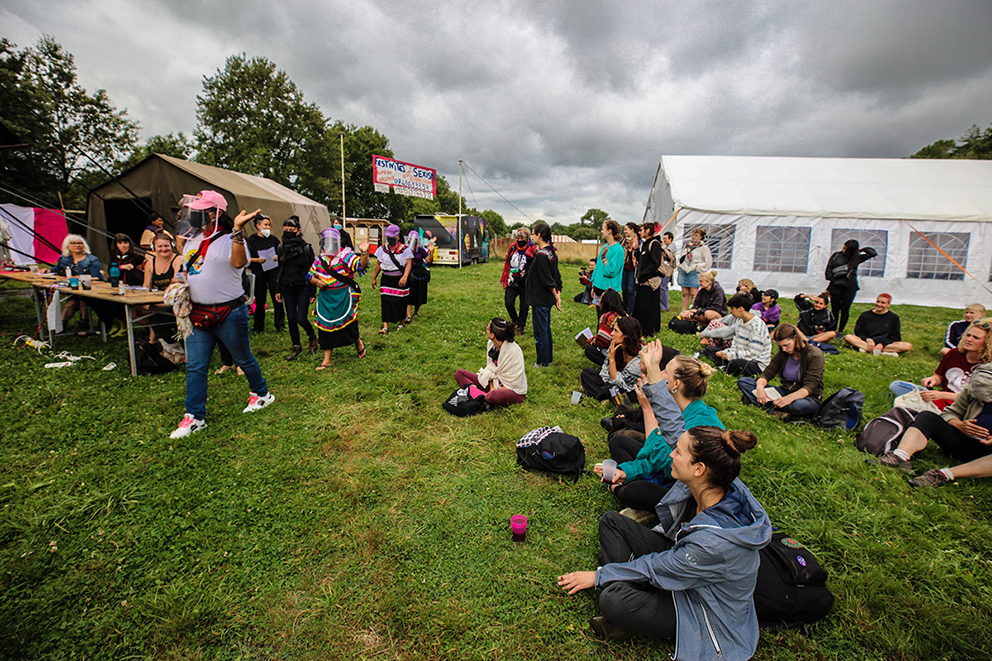
She noted that these interests show up as airports or as any form of dispossession, stating strongly in front of the members of Squadron 421 that the experience of Zapatista autonomy has inspired them in their defense of the land.
“We believe that this encounter will nurture and strengthen our feminist struggles,” she said.
This movement for the defense of the forest and against an airport grew and spread due to the solidarity of different French geographies, and later international ones, such as Atenco in Mexico, which confronted the same urban development problem.
A documentary presented later during the intergalactic shared an account of the struggle the ZAD has waged since the 1960s, when the intention to build the airport began. It showed their fight against the Vinci corporation, which had been awarded the contract to build it.
During the dialogue, those speaking assured that this struggle is a descendant of the Paris Commune due to the way in which they carried out the self-management that persists to this day. They showed this in tours given to the intergalactic’s participants when showing how they created sawmill cooperatives to care for the forests and when discussing the natural habitat of certain species of amphibians and birds as detected by researchers, from which the construction of the airport was delayed during their fight. The scientists’ discovery of these species helped fuel the environmental struggle for this forest.
Then came the referendum under Francoise Hollande, a leftist French president. After the closed result of the consultation, resulting in an almost 50-50 tie, after seeing that the No position won mainly in the Nantes region and the region directly affected, Notre Dame des Landes, Hollande canceled construction. But the women of the ZAD do not lower their guard.


The women’s flotilla

To get to the encounter Many struggles to live, one heart to struggle, 14 women and non-binary people who are sexual dissidents sailed the sea and navigated three sailboats to enter the river Loire, where Squadron 421 was waiting for them on a pier near Cape Couëron.
Each sailboat in the flotilla had departed from a different location, the first from Brest, the second from Douarnenez, and the third from Concarneau, three ports in Brittany. They had sailed for six days to participate.
It was symbolic they come from this region, where the imposition of French almost destroyed the original language Breton. Yet there are still Breton speakers throughout the region, and even in the ZAD there are people who know the language, and several signs on the streets of Nantes appear in both languages.
In a certain way, the collective captains of the three sailboats imitated Squadron 421’s maritime arrival at the Spanish port of Vigo in June, but with a different intention: to show that women also sail sailboats. They took to the sea to visibilize their own struggles and to show their places in a maritime world marked by patriarchal and colonial domination, as they described when they disembarked from the boat.
For Paloma, this has been one of the greatest experiences of her life, learning to maneuver a sailboat and doing it to get to the encounter. Upon arrival, they hadn’t expected the Squadron to be waiting for them, so for her it was felt with great emotion. Her sailboat had a white blanket hung with pink letters that read “Journey for life. Many struggles to live, one heart to struggle.”
Upon docking, disembarking, and assisting fellow sailors from the other boats, Squadron 421 applauded from the dock entrance. Dissident women and people came out one by one, some passing by the Zapatistas, others pausing to say a few words. The meeting was emotional and the afternoon warm amid the wet, cold weather.
The members of the flotilla wrote a song during their navigation, which they sang while leaving the dock and before marching to the plaza renamed “The 12 Women in Anger,” so named after women who opposed an increase in their husbands’ working hours because their increase in work would affect them, too.
In the middle of that square, after marching from the Cape Couëron pier amidst music and applause, the women sang another emotional song that alluded to the struggle of these women defenders of labor rights.


The way to dialogue and agree
Marijose attended a talk on Democratic Confederalism that Jinda Nurkah gave inside a red tent. It was the first time Kurdish women combatants have been in direct communication with the Zapatistas, since on several previous occasions they have alluded to their struggles through letters or pronouncements.

They found themselves inside a circular tent that resembled a small circus tent, but inside, unexpected dialogues took place.
Jinda said that their goal as Kurdish women has been for women to feel safe, hence the common organization and common collective decision. To participate in the fight, Jinda described, you have to look after everyone’s future. She described that in the Democratic Confederalism they exercise, the positions of responsibility are always in pairs, between a woman and a man or between two women. Never two men. These counselors serve on a rotating basis and help meet the needs of all people in the confederations.
She assured that, for them, exercising such confederalism has been a solution to capitalism and the utilitarian vision of the human being. In each assembly, there was also a committee of Jineolojî, which means women’s science, and looks after the autonomy of all women in different spheres or areas of life.
Jinda mentioned the economy, education, health, geography or territory, ecology, politics, self-defense, history, ethics, and aesthetics.
For her, it was important because we all live exposed to the attacks of the governments, the patriarchy, or the capitalist system. In the face of this, Jinda insists, the “recovery of ancestral knowledge, autonomy from dominant men, and the transmission of this knowledge for the fight for autonomy” is fundamental.


“This is a concrete solution for the different problems we have in Kurdistan,” said Jinda, adding that the key is to build from diversity, that the solution to problems is not the state but the respect of differences.
In the middle of the talk, two more members of the Squadron, Carolina and Lupita, arrived and joined in to listen to Jinda.
“The autonomy of women is important for liberation, not only of women but of all people,” continued Jinda on the microphone, who well knows the armed struggle of many women in that part of the Middle East. “Collectivity is power,” she continued.
The important thing is to know and be aware that we have our own vision of ecology, she said. “We know that the system dominates nature to increase its power and threatens women’s potential.
“In our Kurdish community we have a saying: each tree grows on its own land. That’s why it’s important to know all the struggles. Ours is for territory and that makes ours a universal struggle.”

The three Zapatistas did not stop writing and taking notes while Jinda spoke.
Dynamics and complaints
During the two days of the encounter Many struggles to live, one heart to struggle and during the one-day break prior to the intergalactic, people greeted each other in the morning, or in the afternoon, or at night, with a smile.
They walked calmly, knowing their things wouldn’t be lost or stolen. Many wore fluorescent-colored clothing, other skirts, and many jackets, all in an atmosphere of contemplation and understanding.
The consumption of alcohol was prohibited during the encounter (only later in the intergalactic was it allowed), something unthinkable for activists in Europe, due to the consumption and the profits it generates. Here, there was an atmosphere of dialogue and work of mutual recognition that did not involve the distractions associated with these types of beverages. At some point someone complained about the lack of alcohol.
The organizers explained on the microphone during the closing of the encounter that this policy followed the example of how they do in Zapatista territory, where domestic violence stopped with the prohibition of alcohol, also making it possible to reactivate the social fabric at many levels.
Under all the tents there was a listening environment, although not everyone agreed.
On the second day of the encounter during the panel named “Witches,” the women on the panel exposed the damage that patriarchy has done by repressing women’s knowledge, something they declared to be gender genocide.
But discomfort among the dissident community came when the speaker discussing the history of tarot mentioned the body, which they considered as not determinant of gender. There was also discomfort when the speaker was abruptly interrupted. This opened the possibility of continuing to talk some hours later, even if it was not on the program, as well as the next day during the one-day break before the intergalactic.
“I am a lesbian and something that many cis women do not understand is that I do not want to be feminized, it is not only because of [gendered] language,” said a participant on the microphone during the dialogue.
“There is a lack of spaces in the [dissident] community to listen to us,” said a participant who was grateful that with the encounter they were able to realize this, and that they also have to be more proactive in organizing these encounters to promote non-binary themes. “We have to learn together,” they said.
“We are people who are attacked all our lives, discriminated against,” said another participant who took the microphone.
“We have to build a transnational network of dissidents. Interventions are made through bodies, and we need to be more than a title, this is a global struggle,” assured another non-binary participant.
“We need to end the colonialism that is expressed in binarism,” the participants agreed this was the beginning of something bigger for the spaces of the dissident community.
Many struggles
During the intergalactic, Awa Gueye, a young woman of Senegalese descent, denounced the murder of her brother Babacar by the police in Rennes, France. The police had been called for help because he was wounded, but they killed him. She denounced to hundreds of people the abuses, racism, and impunity surrounding the case of her brother.
Without knowing how to read and write, Awa did her own investigation and returned to the building where the police shot her younger brother more than five times in the back, who had just migrated just to be with her and follow in her footsteps. During the intergalactic, she described part of the story that she had to find as the police continue to cover up the culprits to this day.
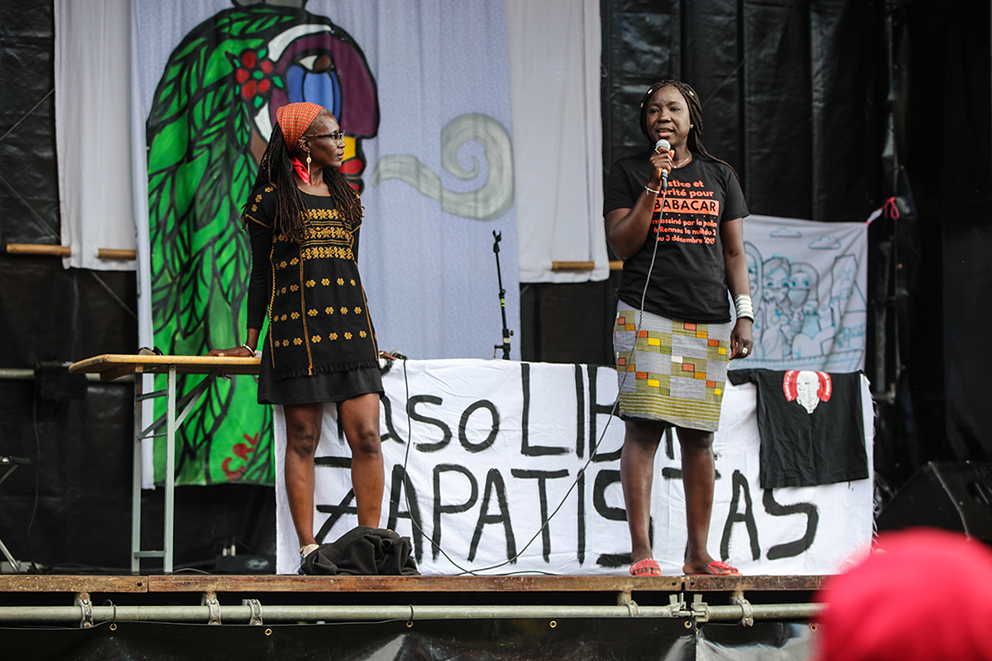
Awa has had to change lawyers five times. The police lost the file and from the beginning denied that it was their responsibility. However, she knows herself to be an intelligent and strong woman even if she does not know how to write. Therefore, she will not give up, she assures, until truth and justice are obtained.
The police violence led to the creation of a link between victims seeking justice: the Network of Mutual Aid, Truth and Justice Against Police Violence. During the dialogue, one of its members read the Zapatista communique called, “From Pain, from Rage, for Truth, for Justice.”
It resonated with the members of the network against police violence throughout France, and now with the participants of this dialogue: “Our collective heart knows, now as before, that our pain is not a sterile sorrow. It knows that our rage is not some useless venting. We, who are what we are, know that our pain and rage are birthed and nourished by lies and injustices.
“Because for those who are above at the cost of those of us below, lying is a way of doing politics and they adorn death, forced disappearance, imprisonment, persecution, and murder with the scandal of their corruption,” read a member of the network.
Fatou Dieng, from the Vié Voleé collective against police violence, read a roll call of the people who are no longer with us, beginning with the name of Samir Flores [a member of the National Indigenous Congress assassinated in Morelos, Mexico in February 2018].
A woman who lives in Barcelona was also present at the encounter. She came representing the union of women who work in hotels called Las Kellys. She carried the distinctive fluorescent green flag that characterizes them.
She assured that the government has played them on the progress they have made at the labor level with an app to make hotel reservations with companies that give fair pay to their workers. Although the platform is ready, the government has not wanted to activate it, and that is why she asked to increase the complaints against this outrage following a discussion on “decolonial feminism,” from which several participants got up and left without listening to what the worker said.
Translators and volunteers
At the encounter, all kinds of voices could be heard in languages such as Kurdish, Hindi, German, French, Spanish, Greek, English, Mapuche, Tsotsil, Tseltal, and Catalan, with great respect. The effort made by various volunteer activists to do simultaneous interpretation was monumental.
More than 50 people participated for more than two days in the translation tables that were in the encounter’s two main tents. In addition, the organization Solidaires interpreted directly for the members of the Squadron 421 when no translation was available.
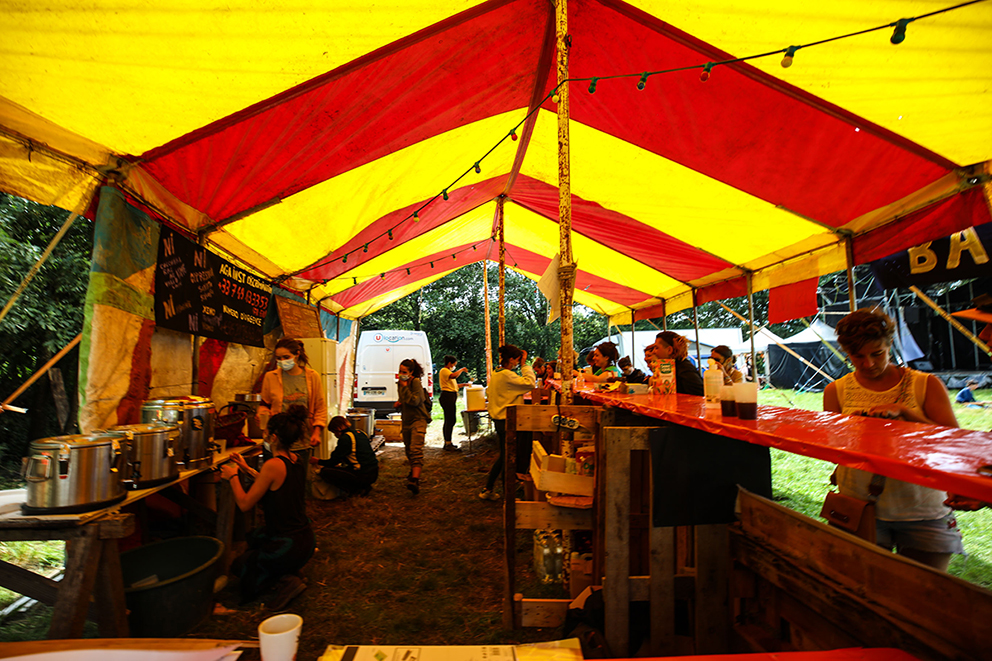
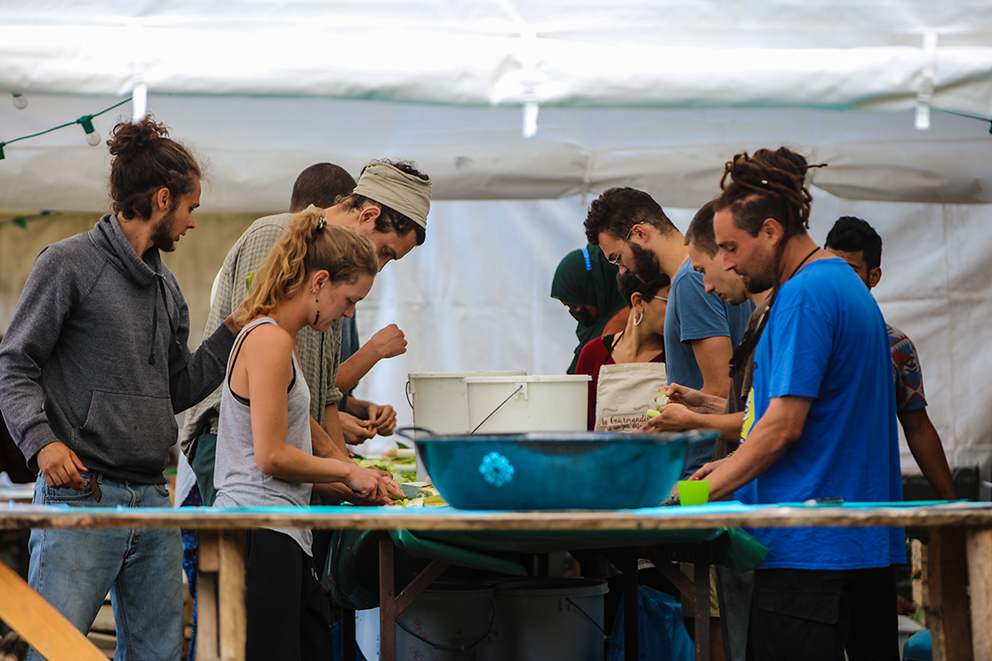
During the event, the participants rented portable radios or called the guests to tune into certain cluster frequencies from their cell phones to be able to listen to the different talks in the language of their choice both during the encounter and in the subsequent intergalactic.
The translation effort was enormous, with tables set up for three different languages for simultaneous interpretation.
This effort joined hundreds of volunteers who arrived a week in advance to set up the tents, the rooms, the dry toilets; and who cooked at the encounter; washed the dishes; and served ginger, orange blossom, and coffee beverages as well as the breakfasts and other meals that were free.
Artistic, rebellious, and mystical expressions
The various groups participating in the encounter proposed and recorded workshops that awoke the imagination of the participants.
Comandanta Ximena attended a theater techniques workshop that demonstrated how to speak in public and prevent dominant voices from influencing our actions in negative ways.

After the workshop, she placed the Zapatista bandana on a paper totem, which was burned with a ceremony at the end of the encounter. She also placed flowers next to it. Inside the totem were the bad things that have happened to us, that we want to eliminate. On the outside was what we wanted to sow and preserve. At the end, the outside was removed and the totem was set alight. And they burned it all.
There was a workshop that was very crowded: the Perrero Combativo [combative dog catcher], which reinvented the movements of feminized and racialized bodies. With music with feminist lyrics, they invited their own movements with the desire to share a message of struggle against sexism, homo-transphobia, classism, and racism.
Every morning there were yoga classes. Every night there were concerts.
At least 15 documentaries were screened, including La Vocera [The Spokeswoman], about the journey to get the independent candidacy of María de Jesús Patricio Martinez (“Marichuy”) on the Mexican presidential ballot. Presenting the documentary was Globale Berlin Film Festival, a team that seeks a critical view of the world in which we live and as well as emancipatory struggles through documentaries.
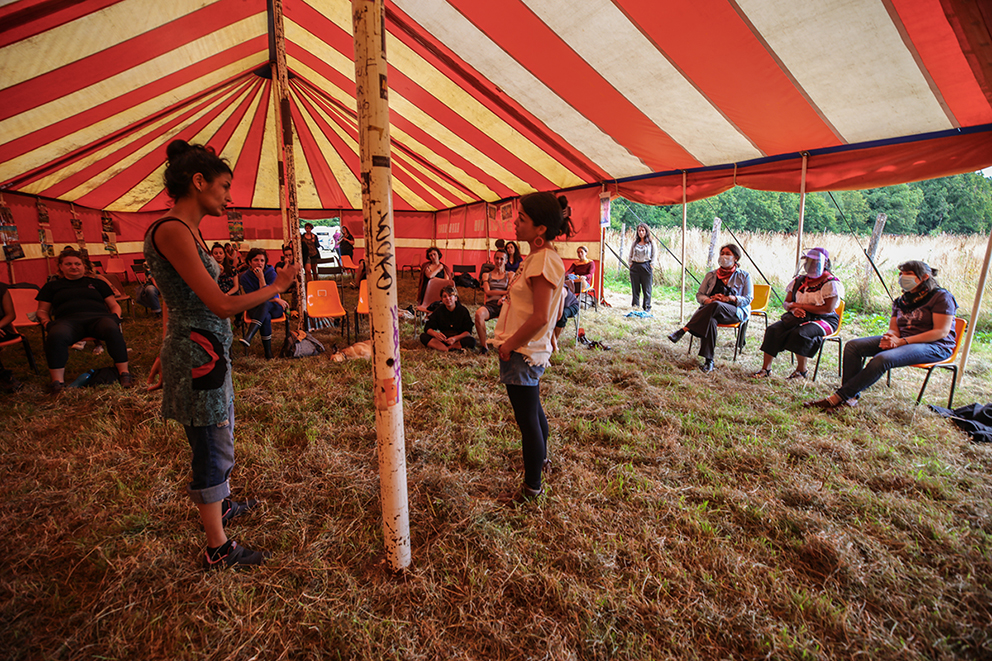
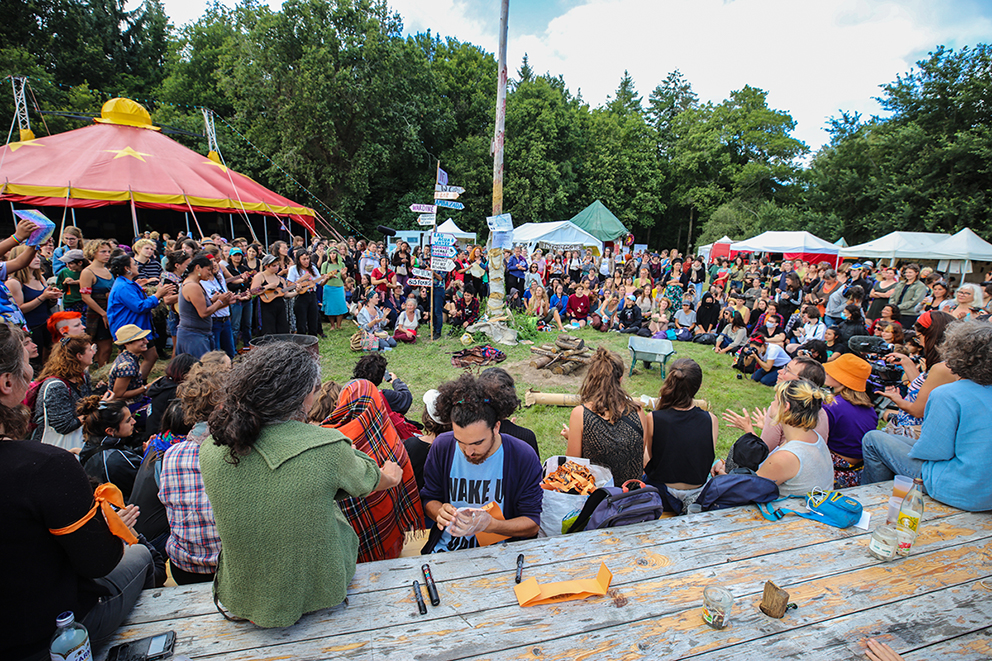
Yuli, a member of Squadron 421 watched along with dozens of women and non-binary people. Those present were excited. Some were angry at the obstacles that the spokeswoman for the National Indigenous Congress-Indigenous Governing Council (CNI-CIG) was confronted with. There was a dialogue where they expressed that this experience gave them an example of how to organize themselves for the Journey for Life. A Mapuche woman assured that as an indigenous person, Marichuy and the CNI-CIG “have motivated us a lot to continue and not stagnate, to try to transcend what we see as a very big problem,” and she reiterated their thanks for the documentary.
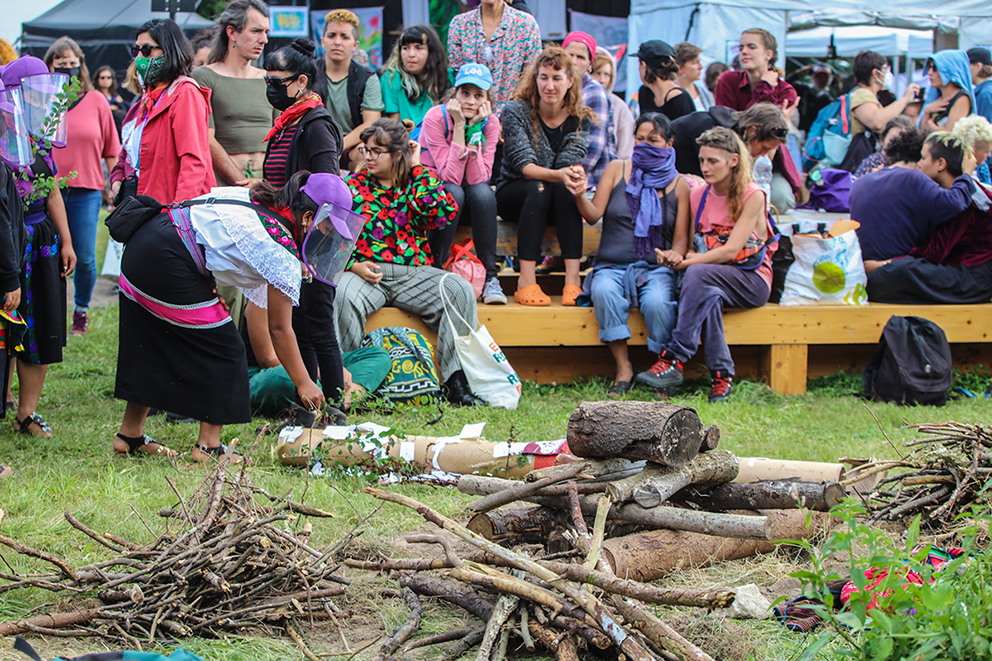
Throughout the encounter there were spontaneous expressions of music, painting, dance, and song. For the closing ritual, hundreds of women spontaneously organized to sing the song, “All jobs are for poor women.” In a circle, they looked at each other while they sang in anger.
Free passage for the airborne Zapatista delegation
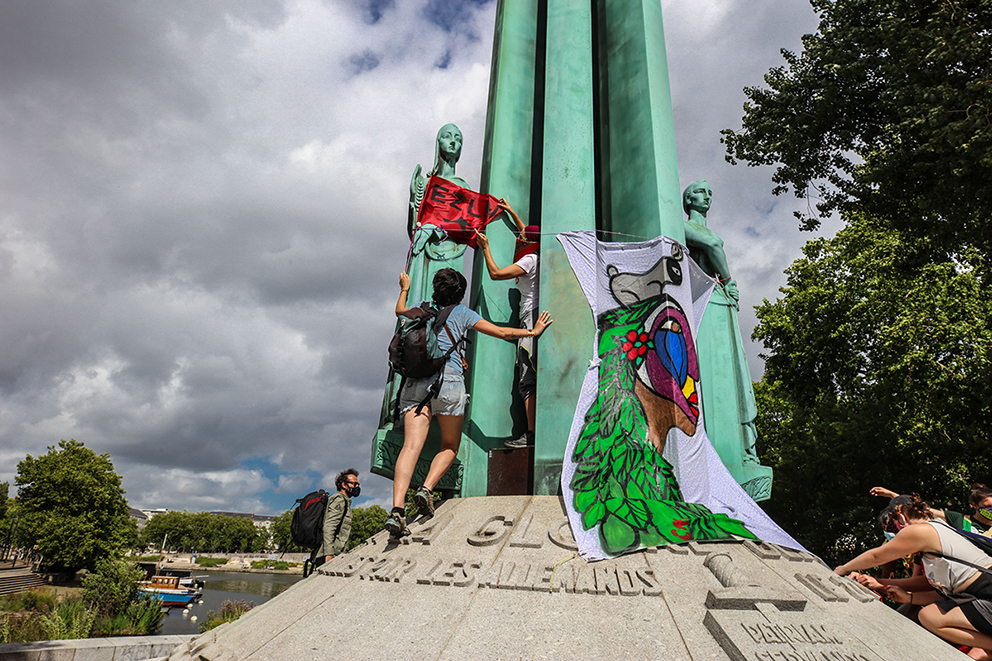
“Down with borders, they are going to fall, they are going to fall. Up with Zapatismo that is going to win, that is going to win,” women and non-binary people with percussions reinterpreted this feminist slogan in front of the Nantes prefecture to demand the entry of the airborne Zapatista delegation, which has been denied by the French ministry until they comply with vaccinations.
More than 300 activists from different European geographies, members of organizations, unions, and collectives demanded the entry of the Zapatista delegation in Europe. “The trip has already begun, we are waiting for our compañeros from the Peoples Front, CNI, and EZLN,” said a member of the Solidaires organization.
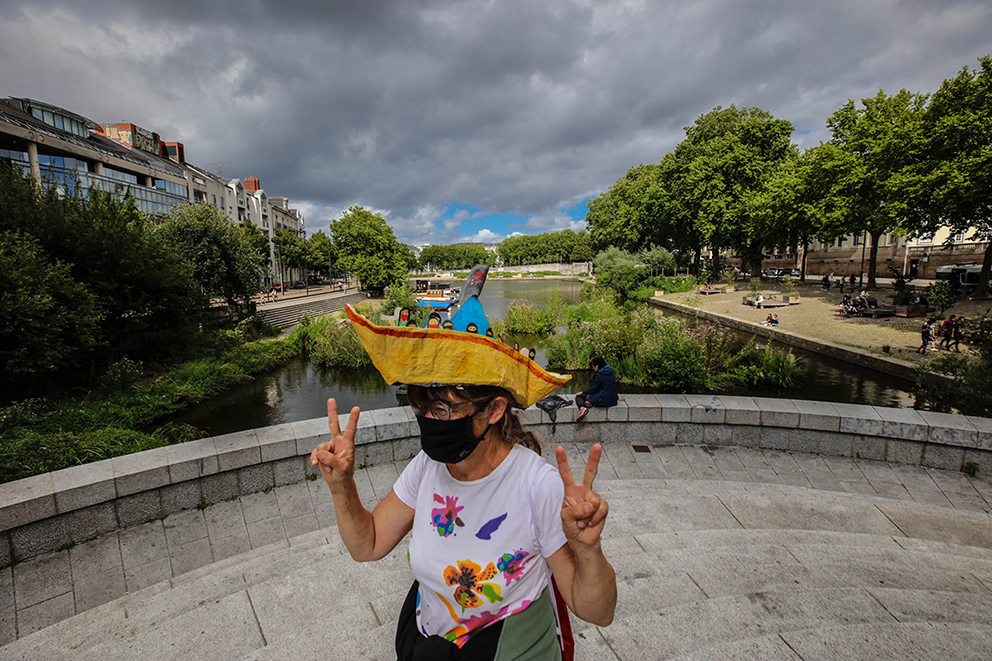
The protest was characterized by different artistic expressions focused on this demand. Feminists performed Perreo Combativo. Jarana players invented a verse on the spot and sang it on the banks of the river Loire. And there, in front of a monument in memory of the hostages murdered by Germans in France in October 1941 during World War II, people embraced while the Zapatista anthem played.
Originally published in Spanish by Pie de Página.
Daliri Oropeza is an independent journalist based in Mexico. She can be reached at @Dal_air on Twitter and Flickr.
Click here to sign up for Pie de Página’s bi-weekly English newsletter.
Ayúdanos a sostener un periodismo ético y responsable, que sirva para construir mejores sociedades. Patrocina una historia y forma parte de nuestra comunidad.
Dona

